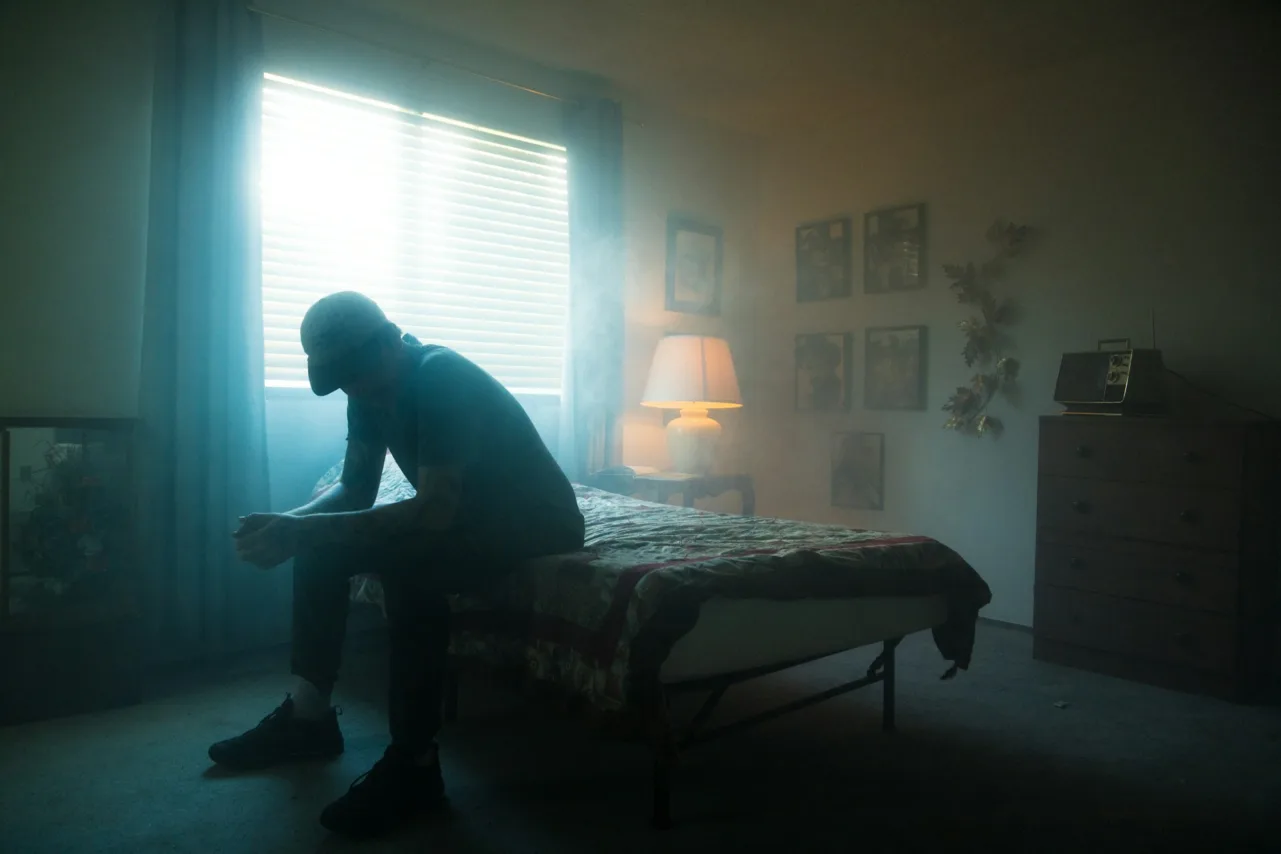
Jakob Owens/Unsplash
Reports show that men living in rural parts of the state are the most at risk for suicide—and Michigan legislators want to help them.
When Simon Zagata was growing up in Manton—a town about 35 miles south of Traverse City—many of the men in his community lived by a “pull yourself up by your bootstraps” code. It’s a badge of honor common to rural areas—but such a do-it-yourself mentality doesn’t always lend itself to caring for mental health.
“Mental health services were so nonexistent that it was like, you have to be in a really bad place to seek them out,” Zagata told The ’Gander. “When I was growing up, it was not thought of as just another part of your health care that you seek out—it was something special and extra that you only seek out in very specific situations.”
According to a 2023 report by the Michigan Department of Health and Human Services, nearly 80% of the suicide deaths that occurred in Michigan in 2021 were men. That’s a total of 1,200 Michigan men who died by their own hand.
Dated stereotypes of traditional masculinity teach many men that reaching out for help is a “weakness,” and they’re still very much alive in rural communities. This stigma—combined with limited access to mental health services and increased access to firearms—can have tragic consequences.
“If the people around me were more open about their lives, their mental health, and the things that happened to them, I probably would’ve been at least more likely to talk about it,” said Zagata.
Instead, he kept his struggles to himself, not feeling comfortable enough to talk to someone about caring for his mental health until later in his adulthood.
After graduating from law school, Zagata moved to Lansing to work as a staff attorney at Disability Rights Michigan (DRM). Not long after starting his new job, he began to feel the physical symptoms of anxiety.
“I was having constant tightness in my chest,” he said. “I felt trapped and anxious all of the time.”
Manning up
How do you break through generations of stereotypes to convince men that it’s important to care for their mental health? It’s a question that Dr. Jodi Frey has been trying to answer for more than 25 years.
Frey is a professor and the Associate Dean for Research at the University of Maryland’s School of Social Work. As a behavioral health researcher, she became aware of the high suicide rates among rural Michigan men while serving as co-chair of the Workplace Suicide Prevention and Postvention Committee.
“We wrote and disseminated the National Guidelines for Workplace Suicide Prevention, and had been working with some folks in Michigan where male-dominated workplaces—and suicide rates—are very high,” Frey said.
Her co-chair, Dr. Sally Spencer Thomas, was aware of the mental health challenges that rural men faced based on her work in her home state of Colorado. Dr. Thomas became so passionate about the subject that she collaborated with the Colorado Office of Suicide Prevention and Denver-based creative agency Cactus to create Man Therapy, a suicide prevention campaign connecting men with mental health resources.
As an independent researcher, Dr. Frey saw the potential that Man Therapy could have on rural men in Michigan.
“Michigan had a really good network of suicide prevention throughout the state, but not with adults,” Frey said.
Thomas and Frey’s program, Healthy Men Michigan (HMM), is based on feedback from men in other studies.
“Men wanted tools to help themselves. They wanted people who look like them to inform them about what works. They wanted a stronger focus on hope, recovery, and resilience—and they wanted it to be funny and engaging,” said Frey.
The program centers around fictional therapist Dr. Rich Mahogany—a self-proclaimed “man’s man” who uses humor and a no-nonsense approach to give men practical and useful advice. He’s like if Ron Swanson became a therapist instead of working in the parks and recreation department.
The researchers launched online promotions, took out space on billboards, and ran public service announcements to let Michigan’s men know about the program. Frey even went on TV with former Detroit Lions quarterback Eric Hipple to talk about mental health and suicide prevention.
“Men needed to hear about it multiple times—from their friends, from seeing it advertised in different ways,” Frey said.
Instead of targeting health care spaces like hospitals or counseling centers, they advertised HMM in places they knew men would be—fraternities, gyms, and workplaces.
The results of the four-year HMM study showed that men who used Man Therapy as one of the digital tools to assess and address their mental health reported a significant decrease in depression and suicidal ideation over time.
Participants also reported reduced numbers of bad mental health days, improved social support, and improved motivation to seek treatment, according to Frey.
“It’s not a replacement for therapy, but I see it as the bridge to the community to engage men and connect them with behavioral health resources when needed,” she said.
Man Therapy also helped connect rural men in Michigan to mental health resources. A follow-up study using Frey’s HMM data showed that men who used Man Therapy reported “significantly improved rates” of engaging in formal help-seeking behaviors through tools like online treatment locator systems, or attending a support group led by a mental health professional.
“We know that the more isolated you are in rural areas increases the risk for suicide,” said Frey. “Rural areas need to have additional support—like Man Therapy—to help engage and then provide support while they’re waiting for an appointment.”
The impact of mental health care
Unaware of the resources being offered through HMM’s programming at the time, Zagata eventually went through his workplace to connect with the federal Employee Assistance Program, through which he received mental health care services for the first time in his life.
“Honestly, it was a little scary because I had never done it before,” he said. “It felt like admitting, ‘I must be in a bad place if I need someone else to help me with this.’ I had never talked to anyone about it before. It was kind of breaking new ground about talking about myself and something that for years I just hadn’t [done].”
While he was initially fearful of speaking to someone about his mental health, Zagata said going to therapy has made a “huge impact.”
Therapy gave Zagata the tools he needed to process what was going on in his head. He said therapy allowed him to open up enough to figure out what the underlying cause of his anxiety was, which led to effective treatment.
“People should not get to the point where it’s urgent and there should be resources and understanding of that,” said Zagata. “If you treat a little rash before it becomes this full-blown skin infection, it will be a lot easier to treat and take a lot less time, money, and effort.”
Elected officials catch on
The success of HMM has encouraged other state organizations to build on Frey and Thomas’ momentum. Preventing Suicide in Michigan Men (PRiSMM) is a statewide partnership designed to reduce suicide rates among adult men in Michigan by 10% over the next five years.
The program is funded through a five-year CDC grant and led by Michigan Department of Health and Human Services,
“We’re using all that we learned [from HMM], but we’re doing more,” said Frey, who is working with PRiSMM to help connect more Michigan men to mental health resources.
She added that state legislators are doing their part to ensure that mental health care access is available to all Michigan residents. Earlier this year, several Democratic state representatives— including Rep. Felicia Brabec, a clinical psychologist—introduced legislation to increase mental health care in Michigan.
“Ensuring timely access to mental health care is not just a matter of policy, but a lifeline for our communities. That’s why we’re putting a clock on insurance companies and requiring a 60-day response to mental health paneling applications,” Brabec said in a press release.
The Advancing MI Mental Health bill package also proposes ways to cut red tape for mental health providers.
“With the introduction of this legislation,” Brabec said, “we are pledging our commitment to making mental health care more accessible so that every Michigander can access the vital care they deserve.”.
Gov. Gretchen Whitmer is also prioritizing mental health care in Michigan. In her executive budget for fiscal year 2025, Whitmer proposed a $249 million investment in behavioral and mental health care throughout the state.
“Michiganders deserve a responsive state government that delivers critical services they rely on,” Whitmer said in a press release. “I will work with anyone to make our state government work better for Michiganders by cutting red tape and investing in critical services.”
If you or someone you know is in crisis or needs support, call or text 988. The Michigan Crisis and Access Line is free, confidential, and available 24/7.
Man Therapy is now managed by Grit Digital Health, a sister company to Cactus.
Support Our Cause
Thank you for taking the time to read our work. Before you go, we hope you'll consider supporting our values-driven journalism, which has always strived to make clear what's really at stake for Michiganders and our future.
Since day one, our goal here at The 'Gander has always been to empower people across the state with fact-based news and information. We believe that when people are armed with knowledge about what's happening in their local, state, and federal governments—including who is working on their behalf and who is actively trying to block efforts aimed at improving the daily lives of Michigan families—they will be inspired to become civically engaged.


We asked, you answered: How Michiganders are beating the ‘winter blues’
We asked ‘Gander readers how they combat seasonal depression in Michigan—here’s what you said. MICHIGAN—Folks who suffer from seasonal affective...

Nessel joins lawsuit against Meta for harming kids’ mental health
A coalition of attorneys general are suing the company behind Facebook and Instagram for using ‘powerful’ technology to get children addicted to...

Here’s How the Biden Administration Has Tackled The Mental Health Crisis
May was Mental Health Awareness Month, and for the past few weeks, the Biden administration has announced a series of efforts to address the...
No Results Found
The page you requested could not be found. Try refining your search, or use the navigation above to locate the post.


